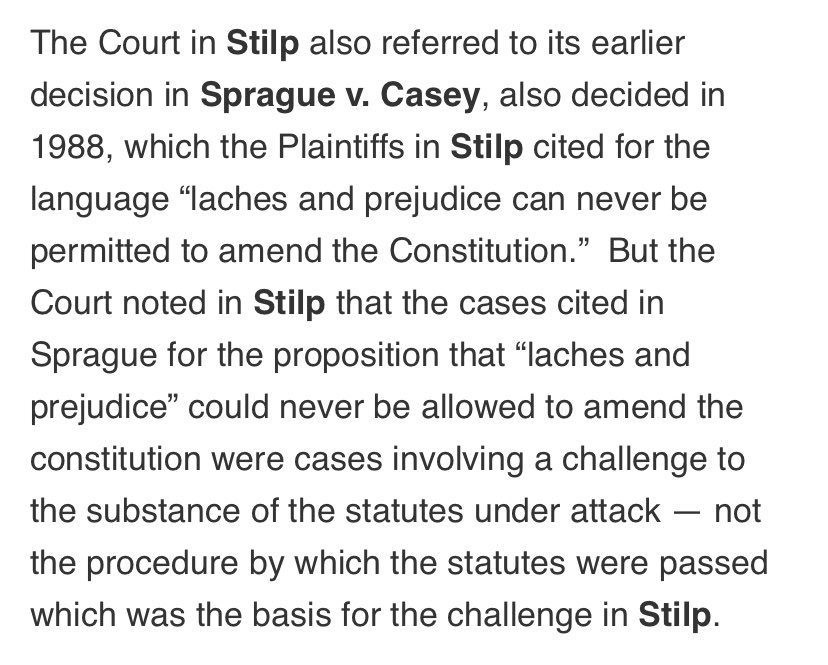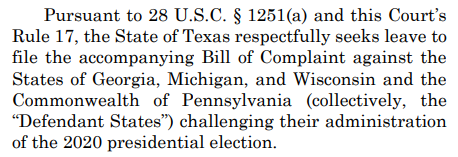
Oh my goodness this article is bad. I have the day off so let’s do a good, old fashioned, “how are you this wrong” breakdown. And I want to lead off with the best one.
Keep in mind this is an argument for the US Supreme Court overturning the PA Supreme Court.
1/
Keep in mind this is an argument for the US Supreme Court overturning the PA Supreme Court.
1/
https://twitter.com/geckotek/status/1335930459872780290
The basic argument is this: Latches can’t apply here because the challenge is to whether a statute is constitutional. So the Supreme Court would reverse.
To support this the author cites, poorly, to “Stilp v. Hafer (1998)”.
2/

To support this the author cites, poorly, to “Stilp v. Hafer (1998)”.
2/


I say poorly because it’s missing two of the ways you’d know that’s not a US Supreme Court case. The actual citation is either “553 Pa. 128 (1998)” or “718 A.2d 290 (Pa. 1998).”
So let’s be clear: even if the author were right, this is SCOPA deviating from SCOPA precedent.
3/
So let’s be clear: even if the author were right, this is SCOPA deviating from SCOPA precedent.
3/
Absent Supreme Court precedent (which should then itself be cited) there argument of “according to the PA Court the PA Court was wrong” is of little weight in front of the US Supreme Court.
But of course “even if the author were right” is wrong.
4/
But of course “even if the author were right” is wrong.
4/
Look at the exact language being cited from Stilp:
The word substance occurs twice in the decision. The first is obviously not what they’re citing to.
The second is, but there’s a pretty glaring problem in the part they omitted. “Appellee’s concede” =/= “we agree”.
5/

The word substance occurs twice in the decision. The first is obviously not what they’re citing to.
The second is, but there’s a pretty glaring problem in the part they omitted. “Appellee’s concede” =/= “we agree”.
5/


Notably, the question of whether laches could apply to constitutional challenges to the substance of a law is irrelevant to the decision in Stilp, which was about procedural challenges. But if it were at issue, the Court in Stilp does not agree with the author anyway.
6/
6/

This is actually a very common mistake among laypeople: mistaking dicta for holdings, and mistaking a narrow ruling particular to the facts of the case for “this is an exception”.
7/
7/
Nowhere does the court say laches *couldn’t* apply to challenging substance, just that it does to challenging procedure.
Sophisticated analysis would also distinguish “challenging the ongoing constitutionality” from “challenging a prior use of the law”.
8/
Sophisticated analysis would also distinguish “challenging the ongoing constitutionality” from “challenging a prior use of the law”.
8/
See e.g Wilson v. School District of Philadelphia, 328 Pa. 225 (1937)
“We have not been able to discover any case which holds that laches will bar an attack upon the constitutionality of a statute as to its **future operation**” (emphasis added)
9/
“We have not been able to discover any case which holds that laches will bar an attack upon the constitutionality of a statute as to its **future operation**” (emphasis added)
9/
Here, the challenge is not made to a future operation of the statute, but to a prior one. As the Stilp court noted of another case in which Laches was inapplicable:
10/
10/

I know I’m harping; this is such a fundamental misrepresentation of the difference between “laches can’t make it that you can’t ever challenge a statute” and “laches makes it that you can’t challenge this application” that it’s worth exploring.
It will also come up later.
11/
It will also come up later.
11/
But let’s go back to the beginning. Because while misunderstanding laches might be the biggest problem, it’s not the *only* problem.
And we can start again with any easy one:
Why would “shall provide absentee voting for these groups” mean “cannot for anyone else”?
12/
And we can start again with any easy one:
Why would “shall provide absentee voting for these groups” mean “cannot for anyone else”?
12/

That’s typically true of the U.S constitution. But do they have any basis for this narrow “shall for these four classes means “can’t” for any others” interpretation of the Pennsylvania constitution being correct?
13/
13/
Hell, do they have any basis for the idea that the constitution’s designation of “physical incapacity” cannot be expanded as the legislature determines?
14/
14/
The PA Supreme Court in Ray v. Commonwealth, 276 A.2d 509 (Pa. 1971) held that the term “qualified electors” was subject to Congressional definition. Why would “physical incapacity” be any less amenable to congressional defining?
15/
15/
Okay, I need to not do ten tweets per paragraph. Though, sorry, one more thing:
The PA election code distinguishes between absentee and mail-in votes. Why would a constitutional provision regarding the former have any impact on the latter?
I’m actually moving on now
16/
The PA election code distinguishes between absentee and mail-in votes. Why would a constitutional provision regarding the former have any impact on the latter?
I’m actually moving on now
16/
Though it looks like they really do substantively skip from that initial bit basically right to “laches can’t apply here therefore.” I’m going to briefly check their sources to see if there’s any additional basis for “laches can’t apply to constitutional challenges”.
17/
17/
The Church Militant source cites for this to Red State, so that saves time. Also it looks like the source for Iachetta’s weird rephrasing of Stilp may actually be one of the other websites he’s cribbing from. Since his actual wording isn’t in the decision.
18/
18/
Lord this red state article is a slog.
A third of the way into the article I finally hit “[b]ut I begin my criticism”. I’m not going to digress into a separate breakdown of *that* hot garbage, but goddamn.
19/
A third of the way into the article I finally hit “[b]ut I begin my criticism”. I’m not going to digress into a separate breakdown of *that* hot garbage, but goddamn.
19/
And I lied. Goddamn is this some disingenuous bullshit.
“A different governor 20 years ago in a different case argued a different legal theory” which this dishonest ass somehow thinks should be followed decades later in a different case due to “ethics”.
20/
“A different governor 20 years ago in a different case argued a different legal theory” which this dishonest ass somehow thinks should be followed decades later in a different case due to “ethics”.
20/

As above, this *dicta* from Sprague was explicitly distinguished based on the fact that in Sprague the challenge was to an *upcoming* election (even if the law was old) not to prior events.
For someone who claims to “always enjoy reading the cases” this dude sucks at it.
21/

For someone who claims to “always enjoy reading the cases” this dude sucks at it.
21/


And, again, it misrepresents Sprague which cited Wilson discussing the constitutionality of a statute’s “future operation” as distinguished from how long the statute had been on the books.
22/
22/

They’re citing a line of cases saying “you can’t claim laches just because it’s been the law for a long time because each new use of the law is a new injury” for the idea that it laches can’t apply to prior acts if they’re alleged to be unconstitutional.
Scurrilous hacks.
23/
Scurrilous hacks.
23/
They also attempt to cite Sprague’s “the defendants could have figured out there was a problem here too” reasoning, ignoring that in Sprague the SCOPA held that “the constitutional violation, as will be discussed infra, is patent.”
24
24
So this whole line of reasoning is just bunkum. It applies a ruling of “you should have known this was patently unconstitutional too” to a case where no such patent unconstitutionality exists.
25/
25/

I’m now half-or-more-way through and other than “I disagree with this ruling based on my reading of prior cases” I’m not seeing where the Supreme Court would want to say anything. Oh well.
26/
26/
But I did get to this brilliant misunderstanding of “prejudice” in the laches doctrine.
“Prejudice” in this context refers to a change in condition of the parties during the period of and in reliance on the delay.
27/
“Prejudice” in this context refers to a change in condition of the parties during the period of and in reliance on the delay.
27/

In other words: “we voted using a mail-in ballot because no one told us that was wrong” or “we mail-in ballots because no one said boo about them” is definitely “prejudice” in this context.
28/
28/
And this analysis of prejudice (an invalid vote is an invalid vote) ignores that someone who *would* have voted in person who relied on the lack of challenge to the mail-in provisions and voted by mail is now disenfranchised in a way they wouldn’t have been.
29/
29/
It’s really funny that the article manages to end without actually discussing the US Supreme Court despite the article being ostensibly about inviting “rebuke” by the Supreme Court.
30/
30/

Also the idea that “elected officials passed this law” is “disenfranchisement” comparable to “vote cast in reliance on the law discarded” is just ghoulish.
31/
31/
And, finally, the addendum is just dumb.
“The Supreme Court only reviews decisions involving federal law, but it might take up this case because laches isn’t state law because equitable claims are not specifically state law”.
32/
“The Supreme Court only reviews decisions involving federal law, but it might take up this case because laches isn’t state law because equitable claims are not specifically state law”.
32/

Back on target for more laches nonsense from the original bad article I’m here to break down. Consider that an interlude. A flashback to the prior dumb article the current dumb article is based on.
33/
33/
This is the part where I said the misunderstanding of laches applying to “not being able to challenge the law” versus “not being able to challenge this particular operation of it”.
And it’s just bad.
34/
And it’s just bad.
34/

It relies on an audience too ignorant to realize that it *does* require new test cases to challenge an unconstitutional law. If I realize decades from now that something the government did to me last week was unconstitutional, it would be subject to laches.
35/
35/
And in case you needed confirmation that in the conservative worldview “following the law” means “agreeing with me about what the law means”, here you go.
36/
36/

And this is simply profoundly antidemocratic. “Voters should lose their ability to vote because the state made a mistake” is just fucked.
Though at least this guy acknowledges the real victims will be the voters who relied on the law.
[end]
Though at least this guy acknowledges the real victims will be the voters who relied on the law.
[end]

• • •
Missing some Tweet in this thread? You can try to
force a refresh








